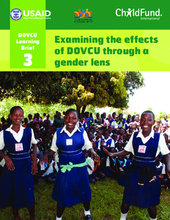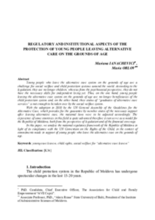Displaying 661 - 670 of 962
This dissertation was an ethnographic narrative study tracking eight young women who were “aging out” or forced to leave their orphanage in Peru, where most of them had spent a majority of their lives. The study examined the way in which a collaborative art community could support the participants as they narrated their lives over a 16-month period of time through photojournaling and social media outlets.
Catalyzing Business Skills is a suite of three financial literacy and business skills curricula developed by Making Cents International and Child Fund's Economic Strengthening to Keep and Reintegrate Children into Families (ESFAM) project in Uganda.
This paper reports on findings from an evaluation study of two institutions providing transition programmes to adolescent girls transitioning from institutional care in Zimbabwe.
This learning brief analyzes quantitative data from both households at risk of separation and reintegrating households to understand how the “Deinstitutionalization of Orphans and Vulnerable Children Project in Uganda” (DOVCU) package of integrated social and economic interventions affects children and households differently depending on the sex of the child, caregiver, and/or household head.
In this paper, the authors analyze the national regulatory framework of the Republic of Moldova in light of its compliance with the UN Convention on the Rights of the Child, in the context of commitments made in support of young people who leave the alternative care on the grounds of age.
Family Care First (FCF) supported the study and documentation of existing reintegration and alternative family care services provided by seven implementing partners in Cambodia. This brief includes an outline of key findings of the study and concludes with recommendations based on those findings.
This paper from the journal of Social Work/Maatskaplike Werk discusses the experiences of parents receiving family reunification services because their children have been placed in child and youth care centres in South Africa.
This article examines the care experiences of former looked‐after children from a residential care setting in South Africa.
This short document provides a summary of initial learning from data gathered for an evaluation of the Why Not? initiative in Scotland. The Why Not? initiative within Care Visions services was started in 2014 to ‘improve the way young people are supported when ageing out of care, by offering a different experience of relationships beyond care.’
This is the second briefing paper published as part of the Howard League’s two-year programme to end the criminalisation of children in residential care. It explores how good practice in the policing of children’s homes can significantly reduce the unnecessary criminalisation of vulnerable children and demand on police resources.







